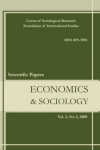THE ROLE OF INSTITUTIONAL
QUALITY IN REDUCING
ENVIRONMENTAL DEGRADATION
IN CANADA
THE ROLE OF INSTITUTIONAL
QUALITY IN REDUCING
ENVIRONMENTAL DEGRADATION
IN CANADA
Author(s): Shahriyar Mukhtarov, Javid Aliyev, Farid Jabiyev, Davut Han AslanSubject(s): Energy and Environmental Studies, Public Administration, Environmental and Energy policy
Published by: Fundacja Centrum Badań Socjologicznych
Keywords: Canada; consumption-based CO2; institutional quality; corruption; FMOLS; Cointegration;
Summary/Abstract: This paper uses the Fully Modified OrdinaryLeast Squares (FMOLS) technique to explore theinfluence of institutional quality, income, consumption ofrenewable energy, trade openness, and total factorproductivity on consumption-based CO2 emissions inCanada from 1996 to 2021. Estimation findings showedthat institutional quality, renewable energy use, and totalfactor productivity exert a statistically significant andnegative influence on CO2 emissions. Moreover, ourfindings indicated that there is a statistically significantand positive impact of income on CO2 emissions, whiletrade openness exhibits an insignificant impact on CO2emissions. The study discusses alternative policies,emphasizing the role of institutional quality in reducingCO2 emissions.
Journal: Economics and Sociology
- Issue Year: 17/2024
- Issue No: 1
- Page Range: 89-102
- Page Count: 14
- Language: English

